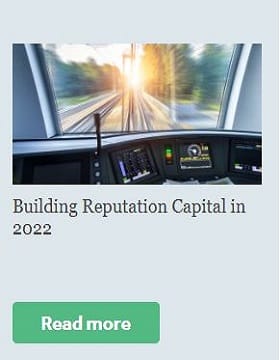
Fashion through the Lens of Sustainability

The Black Box in Biodiversity Communications
COP27 and What It Means for Communicators?
November 2022

by Edward Brewster, a Director of Sandpiper. Ed is a PR industry veteran, with over 25 years of experience working in corporate affairs, media relations and public affairs both in-house and with leading global agencies. He has held senior strategic communications roles with Three, Huawei and Prudential plc.
This week saw the start of the 2022 United Nations Climate Change Conference, known as COP27 (COP stands for Conference of the Parties of the UNFCCC). This, the 27th UN Climate Change conference, is being hosted, in Sharm El Sheikh, Egypt until 18 November.
A year ago, as we headed into COP26 in Glasgow there was a widely held view that political leaders globally faced one overriding challenge, namely the climate crisis. How wrong we were, the war in Ukraine saw concerns about climate relegated below more immediate priorities such as energy, food and geopolitical insecurity and the subsequent rise in prices and increases in both inflation and interest rates.
However, the climate crisis had gone nowhere, in fact over the last twelve months the indicators have gone in the wrong direction, as has the sense of the inadequacy of our collective action. Critically, the public perception of the climate crisis and the challenge we face as humanity has been heightened by the exceptional summer just experienced in much of the northern hemisphere, which saw weather and climate records tumbling.
The climate goals from Paris Agreement in 2015 – namely reducing emissions by 50% by 2030 and achieving net zero by 2050, to keep temperature rises to under 1.5C, are seen by UN-backed scientists on the Intergovernmental Panel on Climate Change (IPCC) to be increasingly challenging. Talks in Glasgow last year concluded with Alok Sharma, the UK President of COP26 saying the limit of 1.5 C is “alive but its pulse is weak.” As a result, the first target of the Presidency of COP27 is to ‘shift from pledging to implementation at scale and on time’.
What are COP27’s expectations for corporates and other organisations?
António Guterres, UN Secretary General has set out clear expectations. He says ‘we urgently need every business, investor, city, state and region to walk the talk on their net zero promises. We cannot afford slow movers, fake movers or any form of greenwashing.’ He tasked a newly established UN High-Level Expert Group to analyse the Net Zero Emissions Commitments of Non-State Entities, including corporations, financial institutions, local and regional governments, with the aim to develop stronger and clearer standards for net-zero emissions pledges by non-State entities and speed up their implementation. This Expert Group has just reported and made a series of recommendations in relation to net zero pledges and commitments from non state actors.
In summary these recommendations are that organisations cannot:
- claim to be net zero while continuing to build or invest in new fossil fuel supply
- buy cheap credits that often lack integrity instead of immediately cutting their own emissions across their value chain
- reduce the intensity of their emissions rather than their absolute emissions or tackling only a part of their emissions rather than their full value chain
- lobby to undermine ambitious government climate policies
The 4As of
Climate Leadership
Leading businesses respond to the climate crisis with Ambition.
Deliver on that ambition with Action.
Speak up to secure wider change through Advocacy.
Drive progress by demonstrating Accountability
To effectively tackle greenwashing and ensure a level playing field, they say that non‑state actors need to move from voluntary initiatives to regulated requirements for net zero. The policy direction is explicit and organisations need to take note.
What priorities has COP27 set for communication and policy experts?
Coming out of COP27 what should communications professionals and public policy teams be prioritising? Our advice is clear. All organisations need to assess and understand their current position, you must ensure your vision and strategy for achieving net zero is clearly articulated, that the implementation of that strategy is being tracked and ultimately that the measurement of the organisational performance, is being reported.
Only through a clear presentation of these key elements can your organisation be confident in communicating its ESG (environments, social, and governance) principles effectively. Taking each of these in turn:
- ESG vision and strategy
What is your organisation’s vision for reducing its carbon footprint, achieving Net Zero, and what is your strategy to achieve it?
Encouragingly, many companies now have a clearly articulated pathway, so if you represent a leadership team where this is not the case you can expect this to become an issue for you, both with your internal and external audiences. In fact, having a clearly defined and articulated vision for achieving net zero is now the baseline, or standard from which every organisation will be assessed, anything less will increasingly be seen as inadequate. However, the focus from policy makers, consumers, media, commentators and other stakeholders, including NGOs will increasingly be on whether the implementation of your vision is meaningful and whether it is actually being measured.
- ESG implementation plan
You must be clear on the details and direction of your plans and how they are being implemented. Internal collaboration is key and close alignment between corporate strategy, legal and risk management divisions as well as internal communications and employees, is imperative. You should be working in partnership with your sustainability and ESG leads and their team, in some cases these may be external consultants, to understand their progress. This collaboration is essential to understand your organisation’s preparedness for end-to-end decarbonisation.
- ESG measurement and raising standards
Finally, the measurement. One of the key policy and reputational issues in 2023 will focus on the reliability and trust in ESG reporting. Is the ESG information that your business is disclosing assured by a reputable third party? Are your targets and achievements being accurately tracked and measured? There has been much said about greenwashing, so if your organisation has just paid lip service to ESG principles, but not actually implemented the often quiet difficult changes to deliver on your commitments, there is an increased risk you will be exposed.
On top of the pressure from policy makers, Sandpiper’s Consumer Expectations Index 2022 study, showed the majority of the consumers in the Asia Pacific region believe the responsibility for addressing climate change lies with our political leaders first and with company leaders second. Our The vast majority (97%) of consumers in Asia Pacific believe in climate change they expect companies to be doing more.
In conclusion how corporate affairs teams, communicators and policymakers articulate their organisation’s position across these three pillars will become essential. We should expect the outcomes of COP27 to prioritise this for all organisations, but commercial ones in particular, this is what we will all be measured against. As communicators, we should welcome this and work with our respective organisations to help deliver on these changes and meet our commitments.






